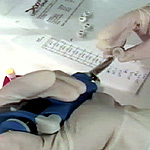2006年VOA标准英语-Genealogical Studies Being Aided by DNA Tests
搜索关注在线英语听力室公众号:tingroom,领取免费英语资料大礼包。
(单词翻译)
By Greg Flakus
Houston, Texas
24 November 2006
watch DNA1 report
Millions of people around the world can trace their ancestry2 back several generations or more through oral history, family documents or government records of such events as marriages and births. In the United States, genealogy3 has become a popular pursuit especially for descendants of immigrants who are interested in knowing where their forefathers5 originated. These genealogical researchers are being aided these days by DNA tests that can sometimes help them bridge gaps left in the paper trail. Sometimes these tests can lead to surprises.
---
 |
| A laboratory technician prepares samples for DNA testing |
But through DNA testing she found out that she also has genetic6 links to sub-Saharan Africa and Native American Indians, bringing her closer to others who descend4 from those lines.
One of Roberta's lines has the surname Younger and many people with this name assume that they are related to the infamous7 19th century Missouri outlaw8 band led by Cole Younger. But Roberta says DNA tests have shown not all Youngers are related.
Pointing to her research Roberta says, "There is the Cole Younger and the Younger gang line and then there is another line, even though they both come out of Virginia and Maryland at about the same time, but the DNA has proven that they are two distinct and separate lines."
DNA tests are most useful in determining genetic links between people who may have little documentation or oral history to guide them. Adrian Williams leads a group of people with the surname Williams, the third most common surname in the United States. There are many branches of the Williams line that may not be related to one another. But Adrian says a DNA test has helped him find connections with others who share his surname.
"Although it could not tell us explicitly9 that that Reuben was the brother of my George,” says Adrien, “when you take the testing along with all the circumstantial evidence, that makes [bridges] the gap."
"DNA is nothing more than a tool in the toolkit for the genealogist10 who has run into a paper trail roadblock," says Bennett Greenspan, President and Chief Executive Officer of Family Tree DNA, the Houston-based company that is considered the world leader in genetic testing for genealogical research. "With DNA testing we are able to unravel11 that history book that is contained within the cells of all of us."
The history contained in human genes12 also links every person on earth to a common genetic origin in Africa. Natural variations in the genes occurred over time as people migrated out of Africa, according to Adrian Williams.
"As that population started expanding, they started migrating. So you have Africa here and then you get these fingers of migration13 out around the world. As that migration is happening, that DNA is also evolving and it is mutating and it is changing."
Family Tree DNA is now working with the National Geographic14 Society on a large-scale program to trace the migrations15 of humankind. One of the experts assisting in this and in the use of DNA for genealogical studies is Professor Michael Hammer, head of the Genomics Analysis and Technology Core at the University of Arizona.
"We do carry mutations that go back a million years in our genome. We also carry mutations that are specific to a particular population,” says Hammer. “Those mutations probably arose in the past few thousand years after that population diverged16 and separated from their common ancestral population."
Professor Hammer participated in one genealogical study with Jewish people who come from the Cohen line and through oral tradition trace their lineage to the ancient Hebrew priests. He says the Y chromosome17 test, which shows genetic links from father to son through many generations, were applied18 to the research question.
"If two people come from different communities but are both Cohen, would they share a Y chromosome type, more so than you would expect by chance if you sampled two random19 people from the Jewish population? The answer is yes."
But Professor Hammer says the use of DNA tests also can tell us how all the various genetic lines have crossed and combined over thousands of years.
"Just by the nature of human migration and mixing in the past, we have not remained separated and isolated20 on different continents all these years. We do have a history of migration and our genome will reflect that," said the professor.
Genetic researchers, driven to some extent by demand from people doing genealogical research, keep coming up with new tests and new ways of tracing our genetic connections with one another.
 收听单词发音
收听单词发音 




